Most Popular
Korean History
-
1
2014 ferry disaster left scars that never healed
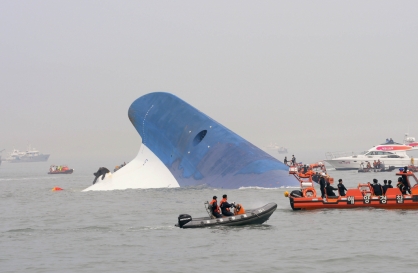
-
2
In 2012, K-pop makes leap from 'Gangnam' to the world
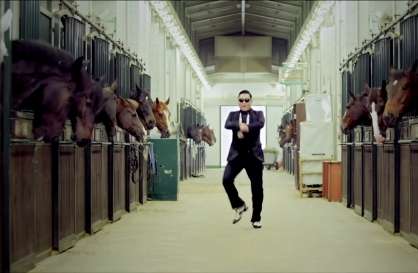
-
3
Deadly sinking of Navy ship in 2010 marks worst postwar military disaster
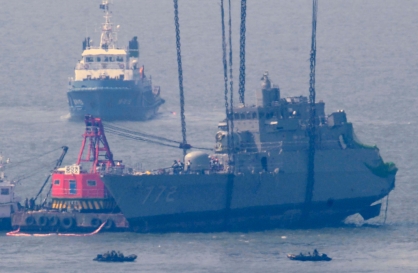
-
4
In 2008, Korea's National Treasure No. 1 went down in flames
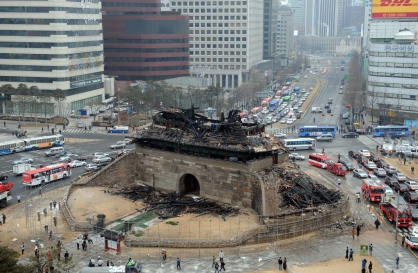
-
5
In 2005, science world’s biggest scandal unravels in Seoul
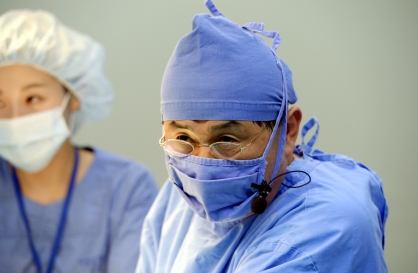
[Korean History] Kim Dae-jung kidnapping: How future Nobel laureate nearly fell victim to junta
Seoul’s intelligence agency later acknowledged its role in the 1973 abduction of Kim, yet many details remain shrouded in secrecy
By Lee Sun-youngPublished : March 16, 2023 - 10:06
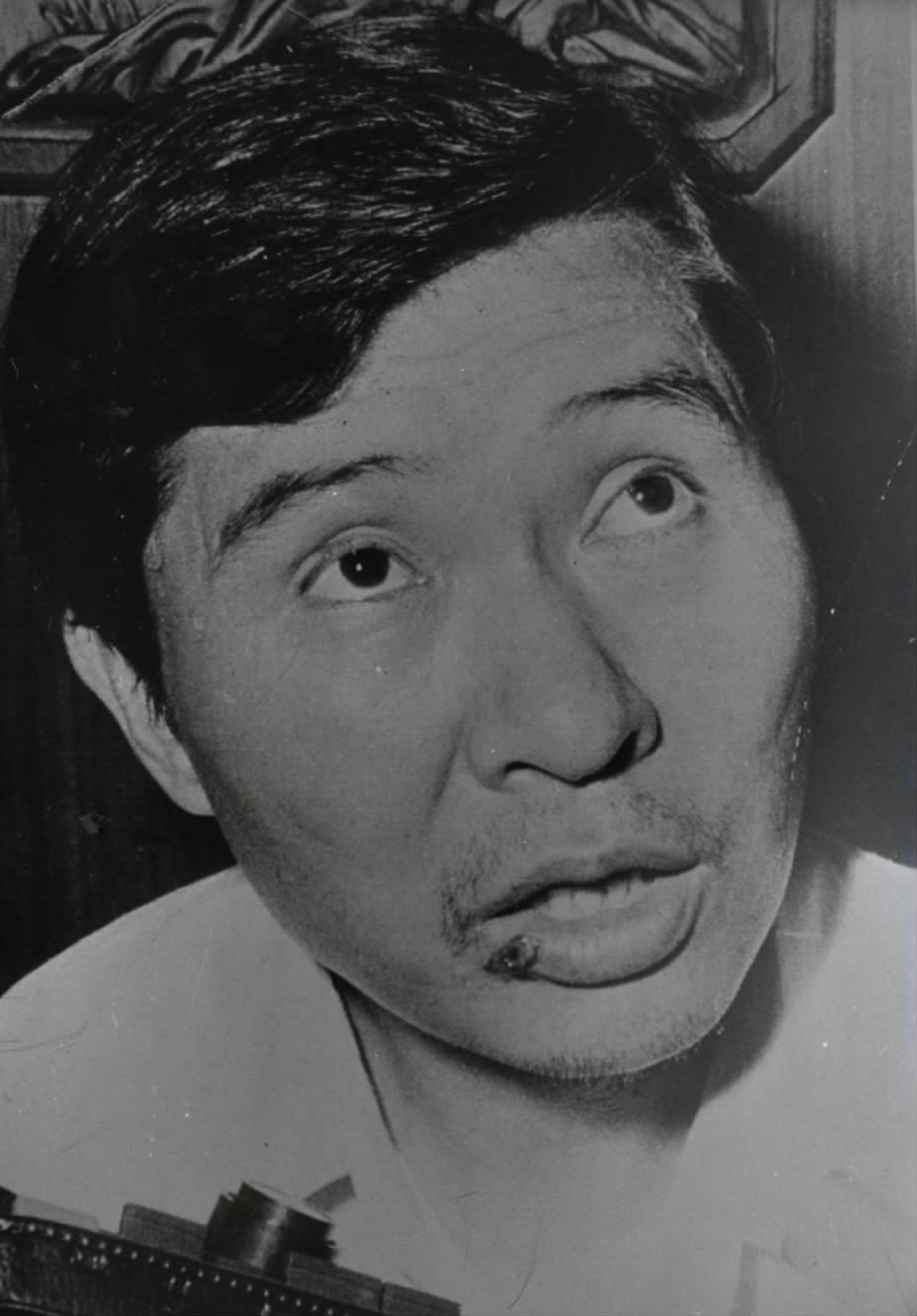 |
Kim, surrounded by journalists, speaks on the phone at his home in Seoul on Aug. 13, 1973, five days after his abduction in Japan. (The Korea Herald)
| Kim Dae-jung, an opposition leader with a knack for public speeches, was the biggest threat to the military junta led by Park Chung-hee. Later, he served as the President of South Korea and was awarded the Nobel Peace Prize. This file photo from 1973 was originally published in The Korea Herald. |
An opposition leader was abducted while in exile in a foreign land. His captors bound him up and weighed him down with heavy stones, preparing to throw him from a ship into the sea. It was then that fate intervened, in the form of a low-flying helicopter sent by a powerful ally. The attempt on his life was thwarted and the pro-democracy fighter lived to fight another day, to later become the president of a democratized nation.
In retrospect, the story of late former President Kim Dae-jung’s abduction in 1973 reads stranger than a spy film. Yet, it was as real as the brutal regime he was fighting against.
Two years prior to being kidnapped at a hotel in Tokyo in broad daylight, Kim had nearly defeated military dictator Park Chung-hee in a presidential election. The next year, in 1972, Park, who had been in power already a decade, declared martial law, dissolved Korea's parliament and rewrote the Constitution to eliminate any future threats and put himself permanently in power.
The faded pages of The Korea Herald around this time are a testament of the pitiful state of press freedom and information control under the Park regime.
The kidnapping, by whom we now know to be agents of the Korea Central Intelligence Agency, and its fallout on the diplomatic front were covered from the Aug. 10, 1973 edition onwards, but the articles did little to unearth the whole truth.
The first report on the case, headlined “Japan cops search for Kim Dae-jung,” has details about the incident as told by the Japanese police: The kidnapping occurred at the Grand Palace Hotel in Tokyo on Aug. 8 shortly after 1 p.m., where Kim was staying and had lunch with two Korean opposition party politicians. A group of five entered Kim’s hotel room, who was with one of the two politicians at that time. The captors took both of them to an adjoining room. While the other person was released almost immediately, Kim “disappeared,” writes the article.
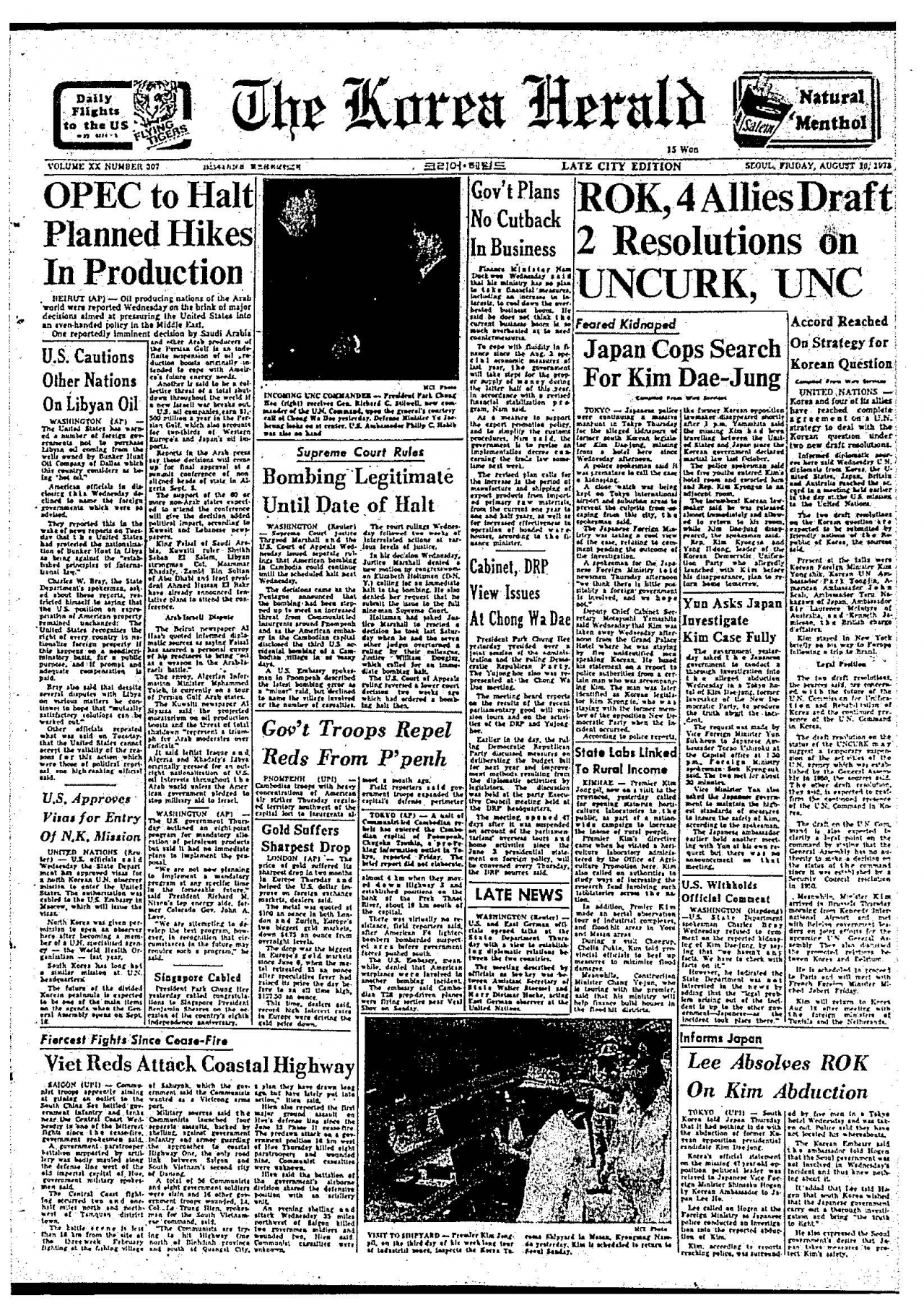
In the days that followed, the newspaper followed the developments from Seoul and Tokyo: from the South Korean government officially telling Japan that it had “nothing to do with” Kim’s disappearance; to a “massive manhunt” being underway in Japan; to Japan's police telling the media they had “no clues about Kim’s whereabouts;” to a press conference in Seoul given by one of the two men who had eaten lunch with Kim before the incident.
Then the Aug. 14 edition carries Kim’s return to his Seoul home, seemingly out of nowhere, five days after the abduction. He had bruises and a cut lip, but was otherwise largely unharmed.
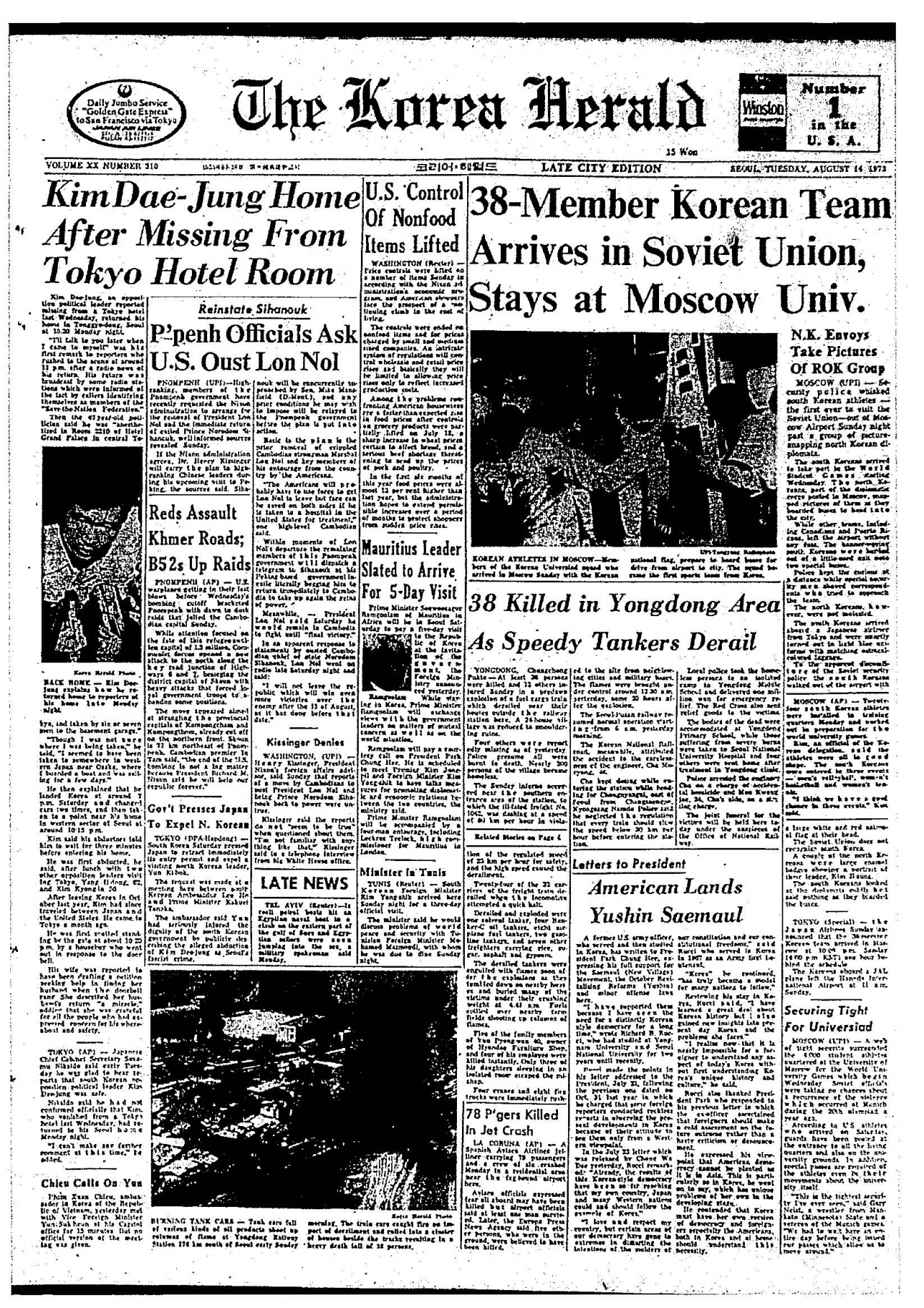
Photos show the dissident leader, who had been in exile since martial law had been declared, surrounded by journalists as he recounted what had happened to him. Notably, he did not explicitly blame the Park government for the incident on that day.

“I seemed to have been taken somewhere in western Japan near Osaka, where I boarded a boat and was sailing for a few days,” Kim was quoted in the article, “Kim Dae-jung home after missing from Tokyo hotel room.” He said he was dropped off near his home in Seoul on the night of Aug. 13.
The next day, The Herald reported that the Korean government began an “intense probe into the Kim case,” which we know now was a pretense, and that Kim was placed under house arrest.
What really happened?
Five decades have now passed and Koreans today know what the kidnapping really was: a failed attempt to eliminate Kim, the biggest threat to the military junta at that time, by its spy agency.
Questions linger though, as some important details still remain shrouded in secrecy. Did Park Chung-hee himself order it or did he not know about it as claimed by some? Did the US really send a helicopter that saved Kim’s life at the last minute? Why did the operation get aborted halfway through?
In 2004, the National Intelligence Service, formerly the spy agency, the KCIA, initiated a fact-finding mission to acknowledge and take responsibility for its past misdeeds. In 2007, after an investigation, the NIS’ fact-finding panel concluded that the agency had been behind Kim’s abduction, citing correspondence between the KCIA head office in Seoul and its dispatched agents in Japan in plotting for the operation as the smoking gun.
The panel pinpointed then KCIA chief Lee Hu-rak as the mastermind, while saying it was unable to ascertain the extent of then President Park’s involvement. Yet, there must have been at least “implicit permission” from Park, the panelists said.
As for the US role in the rescue of Kim, things are murkier.
But there is powerful testimony from Donald P. Gregg, the chief of the CIA in Seoul at that time who later served as the US ambassador to South Korea.
In his memoir, “Pot Shards: Fragments of a life lived in CIA, the White House and the two Koreas," Gregg recounts a conversation he had with then US Ambassador to Korea Philip Habib.
“I know how things work around here. … They are going to kill him, but they may wait until they hear something from me. If you can tell me who has him and where he is by tomorrow morning, we may be able to keep him alive,” Habib is quoted by Gregg in the book.
In October 1973, after Kim was released from house arrest, he gave an interview to Newsweek, the full two-hour video recording of which was uncovered and disclosed to the public in 2021 by Yonsei University’s Kim Dae-jung Presidential Library and Museum.
In the video, Kim tells the US weekly’s Bernard Krisher about his unwavering belief that the politics of Park Chung-hee were harmful to the country. Yet he said he would never harbor any personal grudges toward Park or any individuals involved in the attempt to kill him.
The aftermath
The experience of near death in 1973 was neither the beginning nor the end of Kim’s struggles during one of the darkest periods of Korea’s political history. After Park was killed by his intelligence chief, Kim Jae-gyu, in 1979, another military general – Chun Doo-hwan -- succeeded him in the presidency via a military coup. Under Chun’s rule, Kim Dae-jung was even sentenced to death on charges of treason, although he was able to seek asylum in the US with the help of the international community.
In 1997, 10 years after democracy was restored in South Korea, he was elected president.
In 2000, he won the Nobel Peace Prize in recognition of his lifelong struggle for democracy in South Korea and for peace and reconciliation with North Korea. He died in 2009 at the age of 83.
Archrivals when alive and dead, Park and Kim are remembered by many Koreans as two of most important leaders that the country had.
“Park Chung-hee and Kim Dae-jung have left a significant mark on modern Korean history. Park is known for his role in leading South Korea's economic growth and lifting the country out of poverty, while Kim is recognized as a pro-democracy activist who helped free Korea from dictatorship,” writes Yonsei University professor of political economy Rhyu Sang-young in his book, the Korean title of which can be translated as, “A dialogue between Park Chung-hee and Kim Dae-jung.”
“It may be only natural that the evaluations of these two figures are sharply divided and the debate between their supporters and detractors remains contentious even to this day," he writes.
























![[Today’s K-pop] BTS pop-up event to come to Seoul](http://res.heraldm.com/phpwas/restmb_idxmake.php?idx=642&simg=/content/image/2024/04/17/20240417050734_0.jpg&u=)